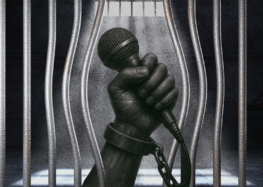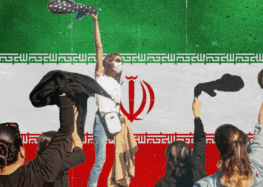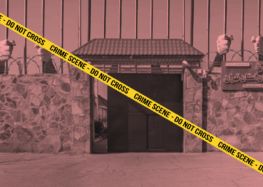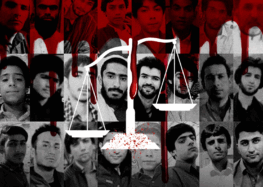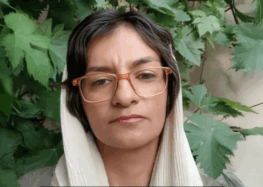Iran’s Truck Drivers’ Strike Sweeps 163 Cities, Dozens Arrested

Families Pressured to Remain Silent to Obtain Release of Loved Ones
Largest Labor Protests in Years Gain Momentum as Strike Enters Third Week
June 4, 2025 — A nationwide truck drivers’ strike in Iran has entered its third week, spreading to at least 163 cities, making it one of the country’s largest labor protests in recent years. Despite arrests and intimidation by authorities—at least 40 drivers and supporters had been arrested as of June 3—the truck drivers have remained steadfast, disrupting major transport routes and gaining broad public support throughout Iran.
“The Iranian government’s crackdown on a peaceful grassroots labor movement reveals its deep fear of ordinary people uniting for their rights,” said Hadi Ghaemi, executive director of the Center for Human Rights in Iran (CHRI).
“Simply for demanding the ability to make a meagre living, dozens of truck drivers are being arrested and their families threatened, but this has only served to solidify their resolve and amass broader societal support,” said Ghaemi.
“These truck drivers aren’t just fighting for themselves, they’re exposing systemic injustices in Iran that affect millions. This could mark the beginning of a larger wave of societal resistance led by Iran’s workers,” Ghaemi added.
The drivers began striking on May 22 in the southern port city of Bandar Abbas, one of Iran’s most critical transportation and shipping hubs, which was rocked by a massive explosion in April. Drivers are protesting against mounting economic pressures, including low fares, rising insurance costs, low freight rates, a proposed fuel price hike, deteriorating livelihoods, and the Iranian government’s disregard for their demands.
In Iran, peaceful labor activism is criminalized—independent unions are not recognized, labor leaders are imprisoned, and workers risk arrest for strikes or peaceful protest.
CHRI calls on international trade associations, the International Labor Organization (ILO), UN bodies, and governments worldwide to demand that the Iranian authorities:
- Immediately release all truck drivers and supporters who have been detained in the context of peaceful demonstrations or strikes;
- Open dialogue with the truck drivers to address their legitimate demands;
- Cease the criminalization of independent labor activities;
- Release all imprisoned labor leaders.
In an interview with CHRI, a civil rights activist inside Iran said:
“Most of the arrested drivers don’t even own their trucks. They work with rented vehicles and come from economically marginalized backgrounds. They’re voiceless, and even contacting their families is difficult. Authorities often tell families to stay silent to secure the detainees’ release.”
Some detainees, the activist added, were arrested just for showing support. The activist noted that the strikes were entirely spontaneous, not led by any union or political group, which made it harder for the government to respond using its usual repressive playbook of targeting organized labor.
In an interview with CHRI, a truck driver working primarily in eastern Iran said:
“These strikes have affected other people too, like farmers and manufacturers. But the reality is, we’re not the cause of the crisis—we’re victims of it too. Just as farmers struggle to survive and keep their livelihoods, so do we. When truckers strike to defend their rights, they’re defending the same rights taken from others.
“Even bakers are striking in some cities. Sure, it might make access to daily bread harder for families, but people know that without protest, the harm will be much worse for everyone.”
Violent Police Tactics Used Against Striking Drivers
At least 40 truck drivers and supporters have been arrested in cities across Iran as of June 3 and the whereabouts and conditions of many of them unknown. The National Union of Truckers and Drivers has demanded the release of their colleagues and reported violent police tactics against striking drivers in some cities.
“Along with making various promises, the authorities continue to issue threats: ‘If you do not proceed with loading cargo, you will be deprived of your legal rights.’ And they arrest honorable drivers, labeling them as ‘disruptors of public security.’ Our response is one word: Resistance — until we achieve our most basic human and legal rights!” the National Union of Truckers and Drivers said in a statement.
In a conversation with CHRI, Saeid Dehghan, a prominent Iranian human rights lawyer and director of the Parsi Law Collective, said:
“The government, instead of responding through dialogue, has resorted to repression, arbitrary arrests, and the intimidation of families, violating not only the rights of the truck drivers and workers more broadly, but also treating them as security threats.”
A few of the publicly identified individuals who have been arrested for participating or supporting the strikes, include:
- Farzad Rezaei, a resident of Divandareh, was arrested on June 2, 2025, by security forces for expressing support for the nationwide truckers’ strike.
- Alireza Faghfoori, a driver from Behbahan, was arrested at home on May 29, 2025, for supporting the strike and taken to an unknown location.
- Kaveh Moradian, Sediq Mohammadi, and Rezgar Moradi were arrested in Sanandaj on May 27, 2025, for participating in the strikes; authorities issued one-month detention orders and transferred them to Sanandaj Central Prison.
- Zanko Rostami, from Dehgolan, was arrested on May 25, 2025, during a peaceful protest by truckers.
- Ata Aziri, a Kurdish driver from Dehgolan, was arrested by agents of the Islamic Republic’s Ministry of Intelligence in Sanandaj on May 25, 2025; his whereabouts and condition remain unknown.
- Shahab Darabi, a Kurdish truck driver and blogger, was arrested on May 24, 2025, by security agents after participating in the strike and expressing support for it online. He was taken from his home to an undisclosed location, and there is no information available regarding his current condition or whereabouts. He had previously been detained in February after criticizing Iran’s elections online.
- Borhan Ahmadi, a 34-year-old truck driver from the village of Arandan near Sanandaj, was arrested on May 23, 2025, outside the city’s freight terminal.
- Almas Fallahzadeh, Ali Jabari, Amirhossein (Sami) Zolfaghari, Morteza Mahdi-Karami, Ehsan Gholami, Hamed Barjian, and Asghar Rezaei were detained by security forces on May 23, 2025, for participating in the strike in Bihar.
“Beyond the need for international and human rights organizations to intervene, what’s urgently required, given the grave violations of due process, including arrests without judicial warrants, denial of access to legal counsel, and particularly the enforced disappearances of some labor activists, is firm action by the International Labour Organization (ILO) to activate its oversight and protection mechanisms for these drivers, rather than limiting itself to symbolic condemnations,” Dehghan added.
Solidarity with Truckers from Across Society in Iran
The truckers’ strikes have been gaining wide-ranging support from the broader public in Iran, who are keenly aware of the economic mismanagement and corruption that have decimated people’s livelihoods, and the government’s harsh repression of any protest or peaceful activism undertaken to address this state of affairs.
Support has come from individuals in a broad range of sectors in Iran, including teachers’ unions, professional associations, leading cultural figures, student organizations, and other civil society groups, as well as from political prisoners in Iran—who risk severe punitive actions by the authorities for speaking out. Iranian Nobel laureates, both inside and outside Iran, have also expressed solidarity with the strikers.
Support from Political Prisoners Behind Bars in Iran:
- Abolfazl Khoran, an imprisoned teacher, has voiced his support.
- Nahid Khodajo and Nasrin Khezri Javadi, imprisoned women labor activists, have voiced their support.
- 13 political prisoners — including Koushan (Khaled) Pirzadeh, Arian Gholami, Reza Ehtemami, Azad Peykarifar, and others — signed a joint letter in solidarity.
“We, the political prisoners, stand alongside the truck drivers and all those on strike at this critical juncture in history, so that we may emerge from this struggle with pride and dignity. We firmly clasp the hands of each and every one of you, brave and honorable individuals.”
- Golrokh Iraee, a prominent political prisoner, conveyed a message of solidarity on behalf of a group of incarcerated women.
“Your cry for justice has been heard from behind the walls of Evin. Your steadfastness and resistance in reclaiming your lost rights in the face of a government that deprives people of their daily bread is truly admirable.
“We, a group of women political prisoners held in Evin Prison, while condemning any security crackdown on truckers and heavy vehicle drivers, declare our full support for their strike. Stay strong and resilient.”
Support from Labor Unions and Civic Groups in Iran:
- Iran’s Teachers’ Trade Union Coordination Council
- Free Union of Iranian Workers
- Tehran Bus Workers’ Syndicate
- Joint statement by the Syndicate of Haft Tappeh Sugarcane Workers, Retired Workers’ Union of Khuzestan, and Coordination Committee for Labor Union Formation
- Fars Teachers’ Trade Association
- Islamabad-e Gharb Teachers’ Trade Association
Support from Leading Cultural Figures in Iran:
- 32 filmmakers issued a public statement backing the strike.
“The rule of incompetence at the helm of the country’s management has led to inefficiency and corruption across economic, cultural, social, and political spheres, grinding the wheels of industry and production to a halt. The people are exhausted by unstable policies and a broken economy that have disrupted their lives.”
Support from Iranian Student Circles:
- Student groups have expressed support, such as Amirkabir University Newsletter, Kurdistan Students’ Nationwide Committee, Kurdistan University, Sanandaj Girls’ Technical College, Yazdanpanah Technical College, Isfahan University, Urmia University of Medical Sciences, Tehran University, and Allameh Tabataba’i University (Tehran).
“Today, Iranian truckers stand consciously and responsibly on the front lines of a struggle that represents the demands of the broader public. This strike reflects the pain of a freedom-seeking nation and embodies a collective will for liberation,” said in a joint statement by a group of organizations active in Iran’s student movement.
Nobel Laureates Weigh in With Support for the Truckers
Prominent human rights activist and Nobel laureate Narges Mohammadi, who is on temporary medical furlough from Evin prison in Iran, has also expressed support for the truckers and their strike. In a recent statement on Instagram she said:
“The truck drivers’ protest is a civil protest in which they are shouting out their demands and rights. Since the Islamic Republic does not respond to the rightful demands of the people and instead confronts them with repression and violence, I believe that all segments of society and professional groups should join and support this strike.”
Prominent human rights lawyer Shirin Ebadi, who was forced to flee Iran and is now based in London, said:
“Whether we call it a strike or not, the message is clear: when working is no longer worthwhile, when the roads are unsafe, when truckers have no say in decisions—they have the right to stop.
“The structural crises of this regime run so deep that even if some demands are temporarily met, there remains no sustainable outlook for improvement. Only through pressure and the continuation of strikes can this decayed order be challenged.”
A Legal and Moral Failure by the Iranian State
Iran’s current crackdown on the truck drivers—as well as it longstanding violations of basic worker rights—violates international law and treaties Iran has signed, as well as the country’s own constitution.
Under the International Covenant on Civil and Political Rights (ICCPR), which Iran has ratified, workers have the right to freely form and join trade unions and to engage in peaceful strikes as a form of collective bargaining.
The International Labor Organization’s (ILO) Fundamental Principles, to which Iran is a signatory, as well the International Covenant on Economic, Social and Cultural Rights (ICESCR), require respect for the right to peacefully protest, to strike, and to independently organize and bargain collectively.
Iranian law is also violated by the government’s arrests, harassment, and threats against the striking truckers and their families and supporters. Article 27 of Iran’s constitution states, “Public gatherings and marches may be freely held, provided arms are not carried and that they are not detrimental to the fundamental principles of Islam,” and Article 32, states, “No one may be arrested except by the order and in accordance with the procedure laid down by law.”
Iran’s ongoing crackdown on the striking truck drivers—through mass arrests, enforced disappearances, and intimidation—grossly violates all of these legal obligations.
“This movement is not just about wages or fuel prices. It is a broader reckoning with decades of injustice, corruption, and economic decay,” said Ghaemi.
This report was made possible by donations from readers like you. Help us continue our mission by making a tax-deductible donation.

